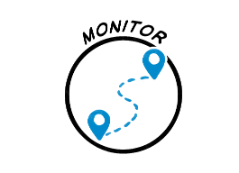
Monitor your outputs
 There are various tools available to help you keep track of where your research is being picked up and used. Using them, you might identify where your work is having an impact, both within and beyond the academic world.
There are various tools available to help you keep track of where your research is being picked up and used. Using them, you might identify where your work is having an impact, both within and beyond the academic world.
Responsible use of metrics
It is important that research metrics are used responsibly, in a fair, transparent and robust way. Over the last five years, the use and alleged abuse of metrics in research assessment has been in sharp focus, with three major frameworks all calling for a significant change in the culture of metrics use:
- (opens in a new window)The San Francisco Declaration on Research Assessment (DORA)
- (opens in a new window)The Leiden Manifesto
- (opens in a new window)The Metric Tide
Following extended, careful consideration, and review of the three major frameworks and policies developed by other universities, UCD agreed its statement on the responsible use of research metrics.
Bibliometrics
Bibliometrics is the quantitative analysis of publications. It can be used alongside qualitative, expert assessment to provide evidence of academic impact. For example:
- Article/book citation impact – The academic impact of particular works (journal articles, conference proceedings, books) can be evidenced by the number of times they are cited by other works.
- Researcher citation impact – The number of works a researcher has published, and the number of times these works have been cited, can be an indicator of the academic impact of an individual researcher.
There are many tools and databases available for tracking citations, including the following:
- (opens in a new window)Scopus – A multidisciplinary database that covers approximately 23,000 journals. Check your profile regularly in Scopus, to ensure your author details are correct and any relevant publications are correctly attributed to you. This is especially important if you have changed affiliation recently. You can update and edit your profile, and add UCD as your current affiliation, via the (opens in a new window)Scopus Author Feedback Wizard.
- (opens in a new window)SciVal – A useful tool for monitoring your academic impact by helping you to visualise research impact, benchmark impact relative to peers, find research partners, create customisable reports, and identify and analyse emerging research trends.
- (opens in a new window)Web of Science – Includes the Science Citation Index, Social Sciences Citation Index, and the Arts and Humanities Citation Index.
- (opens in a new window)Google Scholar – Consists mainly of scholarly material, including journal papers, conference papers, technical reports, theses, pre-prints, post-prints, abstracts and court opinions. It also automatically includes scholarly works from Google Book Search. Google Scholar's strength is the broad scope of content across types of publications and disciplines. It generally has good international and non-English language coverage.
- (opens in a new window)Dimensions – A multidisciplinary source that includes citation data from CrossRef, the field and relative citation ratios, and other indicators from Altmetric.
You can also track online attention through statistics on downloads and views from repositories and social networking sites, such as (opens in a new window)Research Repository UCD, (opens in a new window)ResearchGate, (opens in a new window)Academia.edu, and (opens in a new window)LinkedIn.
![]() LibGuide! See UCD Library's guidance on (opens in a new window)using bibliometics (including how to (opens in a new window)use citation-tracking tools), and their (opens in a new window)guide to Tracking Social Media Impact.
LibGuide! See UCD Library's guidance on (opens in a new window)using bibliometics (including how to (opens in a new window)use citation-tracking tools), and their (opens in a new window)guide to Tracking Social Media Impact.
Altmetric Explorer
Altmetric Explorer for Institutions is an intuitive platform that lets you monitor the online activity surrounding academic research. You can use it to learn:
- Where your research is referenced by policy and patent documents
- Where your research is being picked up by national and international news outlets
- Where engagement with research in your field is happening online
- Who is talking about your research
- Which journals are publishing research that receives the most online attention
You can find detailed guidance on using Altmetrics on the UCD Research Services Portal.
Whenever you mention your research online, make sure that you link to a page that includes your work’s unique identifier. This can be a DOI, arXiv ID, or PubMed ID. This will ensure that your work is tracked by Altmetric, so that you can keep on top of the conversations surrounding your research.
If you’d like to read more about how Altmetric suggest you promote your research online, download (opens in a new window)their guide. You can also consider downloading the (opens in a new window)Altmetric Bookmarklet, a free plugin for your browser that makes gives you article-level metrics on any paper you visit.
Evaluate your online activity
Are your Twitter posts sparking the kind of dialogue you want? Are your videos reaching the right people? To answer questions like these, consider tracking the success of your online activity.
First, establish your baseline. How many followers do you have? How many news articles pick up on your research each month? How many views, clicks and likes do your posts typically receive? From here, you can set KPIs or targets. You might want to increase your followers by X%, or you might want the average visit to your blog to increase by Y seconds. These goals should reflect what you want to get out of your online activity. There’s no one-size-fits-all solution.
If you find you’re not meeting your targets, adjust your approach. Reconsider your audience. Are you using the right platform to connect with them? Do you need to further refine your message?
